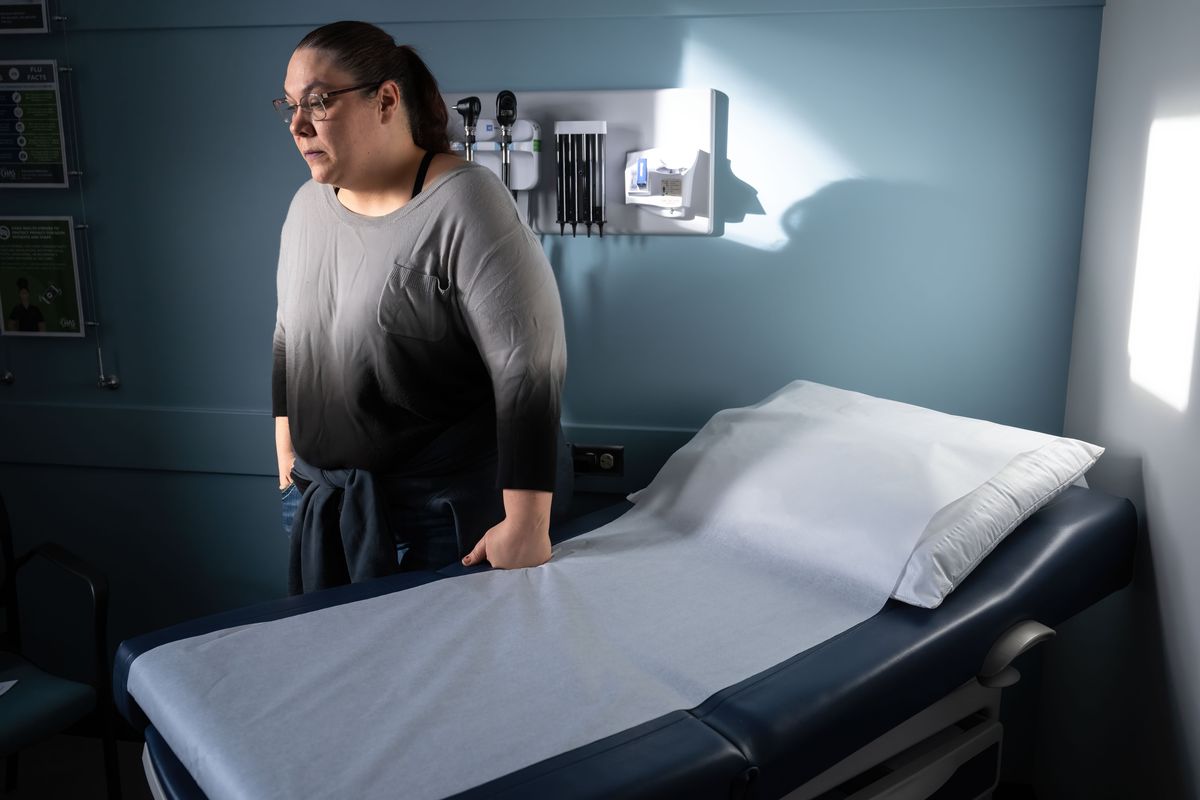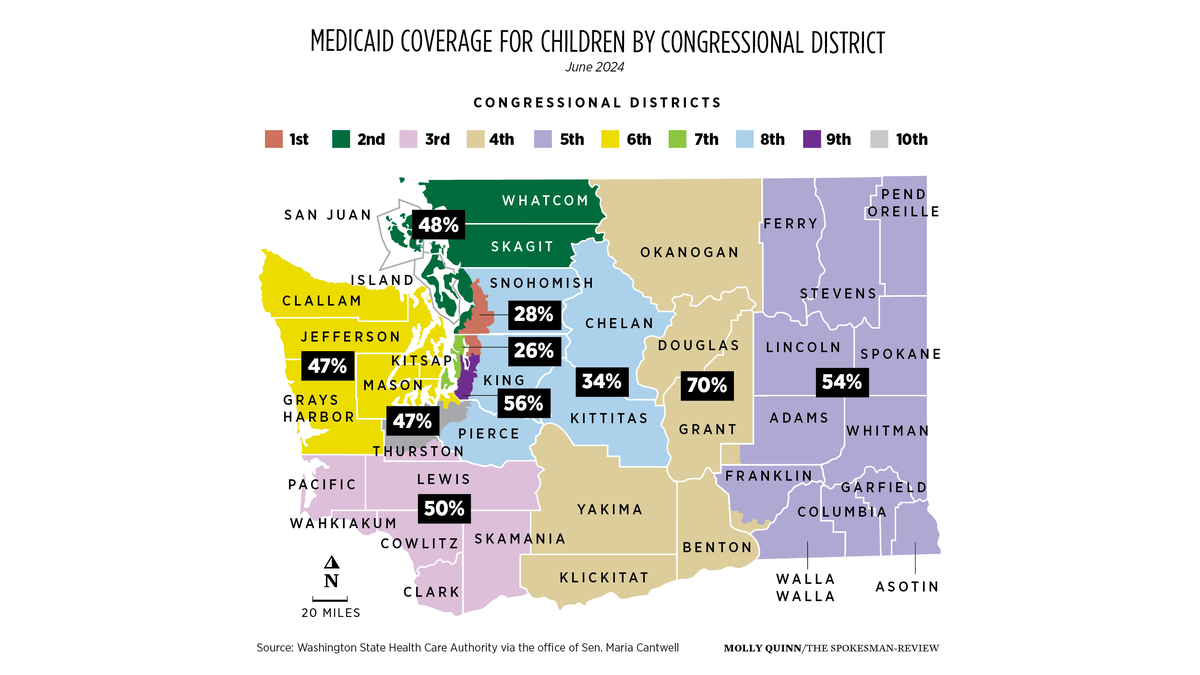Medicaid could be on chopping block after Northwest Republicans help pass House budget measure
Before meeting with her doctor on Wednesday at the CHAS Maple Street Clinic, Jayme Vasconcelos talks about the huge impacts on her family if Medicaid cuts are passed by Congress. (COLIN MULVANY/THE SPOKESMAN-REVIEW)
WASHINGTON – At the end of a dramatic night on the House floor, Republicans on Tuesday narrowly passed a framework for massive cuts to taxes and spending that would likely reduce funding to Medicaid, raising loud objections from Democrats who universally opposed the measure.
The budget resolution, which passed 217-215, begins a process that could allow Republicans to sidestep the filibuster rule and pass tax-and-spending legislation without the Democratic support that would otherwise be needed to reach a 60-vote supermajority in the Senate. But the specifics of cutting costs could prove tricky for GOP lawmakers, in part because many of their constituents rely on the government programs that may be on the chopping block.
The two congressional districts in Washington state whose residents are most reliant on Medicaid, both east of the Cascades, are represented by the only Republicans in the Evergreen State’s delegation: Rep. Dan Newhouse of Sunnyside and Rep. Michael Baumgartner of Spokane.
In an interview on Wednesday, Baumgartner emphasized that states are responsible for how Medicaid funds are spent and called the program “a broken system that costs too much money and does not serve the most needy well, or in a sustainable way.”
“Not only is the system broken and in need of reform, the reality is that America is broke,” he said. “We are $37 trillion in debt and are spending more money on debt payments than we are on national security, so the economic reality and responsibility has to set in, and that is going to require some very needed reforms in Medicaid.”
According to data from the Washington State Health Care Authority highlighted in a report by Sen. Maria Cantwell, D-Wash., 70% of children and 24% of adults in Newhouse’s 4th Congressional District are covered by Medicaid. In Baumgartner’s 5th Congressional District, 54% of children and 22% of adults are insured by the program.
“We are not going to vote to kick low-income kids off of health care,” Baumgartner said, adding that GOP lawmakers intend to incentivize more able-bodied adults to work and states will decide how to spend federal funds. “How Washington state responds to that, with a likely reduction in funding, may result in something like that. But the reality is the federal government has to spend less money.”
As of Wednesday, the U.S. national debt was roughly $36.2 trillion and interest payments on that debt cost taxpayers about $392 billion a year, or 16% of the federal budget, according to the Treasury Department.
While both Democrats and Republicans profess to be concerned about the debt, neither party has taken serious steps to pay it off since the turn of the 21st century.
President Donald Trump approved a net increase of $8.4 trillion to the nation’s debt in his first term, and former President Joe Biden approved an additional $4.3 trillion, according to the Committee for a Responsible Federal Budget, a nonpartisan group that advocates for deficit reduction.
Republicans haven’t spelled out the details of their plan, which would reduce federal spending by $2 trillion and cut taxes by $4.5 trillion over a decade, but it instructs the House Energy and Commerce Committee to cut $880 billion. By far the biggest chunk of money in that panel’s jurisdiction goes to health care, and while Trump has said he opposes cuts to Medicare – the federal insurance program for seniors and some younger people with disabilities – he has made no such promise when it comes to Medicaid, which provides health insurance to low-income children and adults, pregnant women and people with disabilities.
Shawn Murinko, a Washington civil rights attorney and disability advocate with cerebral palsy who previously served on the Washington Human Rights Commission, said he is concerned that the House budget could impact the Medicaid-funded Home and Community Based Waivers program. Without the program, he said, many people with disabilities would not be able to live at home independently.
“When you talk about Medicaid cuts, they would be literally impacting folks’ ability to go to bed each night in their own home and be a part of their community,” Murinko said. “Today there is a lot of worry and anxiety within the disability community as a result of these proposed cuts. And that is a result of what I believe is an orchestrated attack on the rights of people with disabilities.”
Rep. Russ Fulcher, who represents North Idaho and sits on the Energy and Commerce Committee, said he and his fellow Republicans don’t intend to cut benefits for what he called the “traditional Medicaid population,” including children and people with disabilities.
“We’re trying to get a handle on what can be done without cuts,” Fulcher said, suggesting that GOP lawmakers may start by adding work requirements for adults who can work and capping Medicaid spending so that it doesn’t increase with inflation and population growth.
“I think there’s a real sensitivity to making sure the traditional population is not impacted,” he said. “But on the other hand, there is controversy – always has been – on the expansion population of working-age, able-bodied adults.”
The Affordable Care Act of 2010, often called Obamacare, allowed states to expand Medicaid eligibility to cover more uninsured people while splitting the cost with the federal government. The system of funding the Medicaid expansion Idaho voters approved in 2018, Fulcher said, “was not sustainable from the get-go.”
Lisabeth Kelly, a family physician at CHAS Health in Spokane, estimated that 90% of her patients rely on Medicaid. Any cuts to the program could prevent her from providing care to Spokane residents, she said, and would be more expensive in the long run because patients would go to the emergency room instead of a family medicine clinic like CHAS.
“We’re already working with limited resources,” she said. “The idea of working with less is scary.”
Before an appointment at a CHAS clinic on Wednesday, Spokane resident Jayme Vasconcelos said that without Medicaid, she would have to quit her job and home-school her two children. Because of the adolescents’ behavioral issues, she said, they would not be able to attend public school without access to Medicaid-covered medication and in-school support.
“If I didn’t have Medicaid, I would have nothing,” Vasconcelos said, questioning why lawmakers would consider cuts to children’s health insurance. “I just don’t understand. That all just doesn’t make sense to me.”
“There’s a lot of running room for some improvement,” Fulcher said, “without taking a meat cleaver to it.”
Newhouse said it is too soon to assume which programs will be cut in his party’s final budget package, which would need to be reconciled with a different version that Republicans are advancing in the Senate.
“We must ensure the neediest in this country are taken care of, but we are barreling toward insolvency for the programs they rely on,” he said in a statement.
“I am prioritizing common-sense reforms that cut waste and abuse while delivering critical services to those that truly need it most.”
Ahead of Tuesday’s vote, some GOP moderates expressed concern about the Medicaid cuts the budget resolution seems to require. Several fiscal hawks on the party’s right wing also initially opposed the measure, arguing that it didn’t cut enough spending. But after House Speaker Mike Johnson, R-La., moved to withdraw the vote and send lawmakers home for the night, cajoling from GOP leaders and calls from Trump convinced all but a single Republican to vote for the resolution.
Democrats unanimously opposed the measure, accusing Republicans of threatening health care for low-income Americans in order to cut taxes for the richest people and biggest businesses in the country. While the House and Senate versions of the budget differ, Trump has insisted that the final bill should extend the tax cuts Congress passed during his first term in 2017 while adding new tax cuts he promised during the 2024 campaign, including the elimination of taxes on tips.
“Trump and Musk are preparing lifeboats for billionaires who can already buy their own fleet of yachts, but ripping away support for families who have been struggling for years to keep their heads above water,” Sen. Patty Murray, D-Wash., said in a call with reporters on Wednesday, highlighting the prominent role of Trump adviser Elon Musk, the world’s richest man.
Baumgartner said he would like to have a serious conversation with Democrats about balancing the budget and reducing government waste, invoking former President Bill Clinton, a Democrat who declared in 1996, “The era of big government is over.”
“It’s unfortunate that the Democrats are so focused on scare-mongering about cuts rather than having a responsible discussion about the reforms needed to make sure that America can be on better fiscal footing and that the program can be around for future generations,” he said, referring to Medicaid.
“Anyone that’s being honest about Medicaid would tell you that it’s rife with waste, fraud and abuse,” Baumgartner said, “and particularly that it disincentivizes able-bodied males – and females, but particularly able-bodied males – from getting out of the house and getting a job.”
The Spokane lawmaker blamed Democrats in the state Legislature and governor’s mansion for spending money irresponsibly, suggesting that Washington would be in better fiscal shape if the state had followed the model of Wisconsin, which hasn’t expanded Medicaid in the 15 years since the Affordable Care Act made that possible.
“The situation does need a lot of reform,” Baumgartner said. “With all that being said, the changes that Republicans are likely to make to Medicaid are actually fairly minor in the grand sweep of things.
“We’re simply looking at giving states more authority to decide how they want to spend their federal dollars.”
Before the House budget outline can become reality, it would need to be adopted in the Senate, where Republicans have already passed their own, narrower bill focused on defense spending and border security.
GOP senators plan to tackle tax policy in a separate bill, where Sen. Mike Crapo, R-Idaho, chair of the Finance Committee, is set to play a central role.

